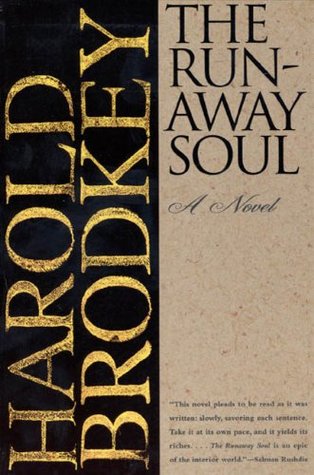I’ve been trying to figure out what somebody could do with the thirty bucks (plus tax) that they’re asking for Harold Brodkey’s word-processing product. My copy was no bargain for free. You could buy two pizzas and two sixpacks and have quite a party for that sum. You could wire your sweetie pie a nice bouquet by FTD. If movies were worth seeing, you could buy five tickets. There are all kinds of things you could do with the money, but the big loss is in time and energy—time that might have been spent on subgingival curettage or root canal work or study of feminist theory or whatever. Perhaps a mercifully brief description of The Runaway Soul will show just why its perusal would seem fitting for few others besides Harold Bloom, Gordon Lish, Keith Mano, and those who have puffed Harold Brodkey’s “genius.” There are two elements of the novel that I can bring myself to comment on. The first is substance; the second, style.
The Runaway Soul is a highly subjective Künstlerroman freighted with an elaborate psychological apparatus, a Freudian family romance, and a concentration of the hero-narrator’s “growth,” “genius,” consciousness, and masturbatory sex life. The orphan Wiley Silenowicz, whose adoptive name suggests both wiliness and Silenus, relates somehow the tangled bafflements (he does not or cannot “tell a story”) concerning his second family: his father S.L., his mother Lila, and his older sister Nonie. These characters each have their moments, their presences in Wiley’s life and consciousness; of the three, one inspired in me a flicker of interest—Nonie, who seems to be pathologically wicked and hates Wiley, and who appears to have killed two other siblings. My own hope—that she would terminate Wiley’s interminable “narrative” by stabbing him to death with a sharp instrument, by killing him with a revolver or with a sporting rifle or shotgun or semiautomatic or fully automatic weapon, by setting him on fire with gasoline, or by squashing him to death with a laundromat—was not fulfilled. Other characters in the novel include a lover of Wiley’s later years, Ora (a.k.a. Orra), whom I took to be female even though at least one of Wiley’s sexual encounters with her/him seemed to end—if that is the right word—in yet another of his physical and literary masturbations. Anyway, Wiley’s homosexual episodes with Remsen and Daniel and others are entirely suited to his character, being either literally or essentially masturbatory in those same senses of that word by now extremely familiar to both the reader and the explicator of The Runaway Soul.
Reading between the lines that are themselves unreadable, we may discern the elements of a novel that somehow escaped the master’s grasp. There are even brief glimpses of daylight and of the out-of-doors, as well as of social life, which in other hands would have constituted a narrative; though even here, we would have had to admit that touches like Ora’s father, the literary scene as embodied in New York cocktail parties, and a few others, constitute material that has already been treated adequately by Norman Mailer.
Even granting the genius his donnée, there may yet be some slight reservation about a prose style that would gag a buzzard. The trouble with Wiley-as-narrator is that he writes like Harold Brodkey on a good day. He seems to have an ungift, an ineptitude with language that he inflicts unsparingly on his audience: he goes for the off-putting word—even the wrong sound, not to mention the unwelcome thought—unerringly. As Wiley lovably says, “But, for me, isn’t it self-love that starts the progress towards orgasm?” He knows himself: “I sort of gawp—inwardly.” Ain’t it the truth.
The following lines, chosen by a sorites Brodeyanae, represent the ineffable style of the revered master: “I don’t know of what elements my heterosexuality consists. Or my androgyny.” And this paragraph:
It wasn’t that I was so grand sexually. I am acceptable sexually (which is actually quite a lot), but I make a point of it, of being that, and that doubles the acceptability for some people, that it is something known, and that one tries to be it. Often, then, I am a little bored sexually—that redoubles it . . . Only a little bored . . . “You are the handsomest man in the world”—she says that; it is a metaphor of a kind. She was collecting herself, finding herself, in an inconsecutive way, among the consecutions of our invention of our sexual tone back and forth, and in the faith that in the sequence of moments something might happen and all the moments (all our moments) were unbetrayed so far and would be unbetrayed still at the end, sort of.
The combination of substance (masturbation and genius) conveyed by style (noisome droning—the Brodkey touch) is one that leaves something, anything, and everything to be desired. Reflection suggests that The Runaway Soul, besides not having any soul, didn’t run away far enough, and that if there had been any Künst, then there might have also been some Roman. As it is, this thing ranks not only with the worst novels I have read in the last 35 years but with the most unpleasant experiences I have ever endured. To listen to Wiley Silenowicz relate the uncanny growth of his narcissistic mind, only to wind up with yet another tenderly rendered masturbation scene after some seven hundred pages, is enough to confirm thoughts about the New York literary. scene that I have long entertained.
Considering with how much breathless expectancy this book was anticipated (for 27 years), we may well wonder about the competence of those who touted the author for a generation. And when we consider the price that is asked not so much in money as in exasperation and degradation, we may also wonder about the state of culture in a nation with such an inverted sense of art.
[The Runaway Soul, by Harold Brodkey (New York: Farrar, Straus & Giroux) 835 pp., $30.00]

Leave a Reply